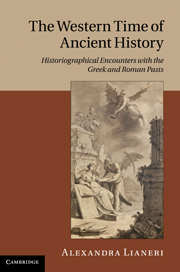Book contents
- Frontmatter
- Contents
- Acknowledgements
- Notes on contributors
- INTRODUCTION
- THEORISING WESTERN TIME: CONCEPTS AND MODELS
- ANCIENT HISTORY AND MODERN TEMPORALITIES
- 5 The making of a bourgeois antiquity: Wilhelm von Humboldt and Greek history
- 6 Modern histories of ancient Greece: Genealogies, contexts and eighteenth-century narrative historiography
- 7 Acquiring (a) historicity: Greek history, temporalities and Eurocentrism in the Sattelzeit (1750–1850)
- 8 Herodotus and Thucydides in the view of nineteenth-century German historians
- 9 Monumentality and the meaning of the past in ancient and modern historiography
- UNFOUNDING TIME IN AND THROUGH ANCIENT HISTORICAL THOUGHT
- AFTERWORD
- Bibliography
- Index
8 - Herodotus and Thucydides in the view of nineteenth-century German historians
from ANCIENT HISTORY AND MODERN TEMPORALITIES
Published online by Cambridge University Press: 03 May 2011
- Frontmatter
- Contents
- Acknowledgements
- Notes on contributors
- INTRODUCTION
- THEORISING WESTERN TIME: CONCEPTS AND MODELS
- ANCIENT HISTORY AND MODERN TEMPORALITIES
- 5 The making of a bourgeois antiquity: Wilhelm von Humboldt and Greek history
- 6 Modern histories of ancient Greece: Genealogies, contexts and eighteenth-century narrative historiography
- 7 Acquiring (a) historicity: Greek history, temporalities and Eurocentrism in the Sattelzeit (1750–1850)
- 8 Herodotus and Thucydides in the view of nineteenth-century German historians
- 9 Monumentality and the meaning of the past in ancient and modern historiography
- UNFOUNDING TIME IN AND THROUGH ANCIENT HISTORICAL THOUGHT
- AFTERWORD
- Bibliography
- Index
Summary
The development of modern historical science in Germany from the beginning of the nineteenth century brought about a sharp break from earlier views of classical antiquity. From the Middle Ages via the Renaissance to the Enlightenment, antiquity, whether in a narrow or a wider sense, whether through imitation or delimitation, had been ascribed normative significance, whereby it eclipsed all other epochs. With the emergence of modern historical thought, which disputed the validity of transhistorical values, the foundations of this view were undermined. The new insight into the historicity of human life, the ‘world as history’, brought into being through the experience of the tremendous dynamism of the French Revolution and the consequent political-social struggles, now admitted only individual phenomena which had value solely in themselves. In this view, all epochs were fundamentally the same; each was, as Ranke famously put it, ‘immediate to God’, each had ‘its special tendency and its own ideal’, was incomparable and untranslatable; none should be elevated or denigrated in comparison to the others. It was thus inevitable that antiquity lost its exclusive position and became just one epoch among others, of merely historical significance.
However, antiquity was still held in high esteem even among these German historians. There were two reasons for this. Firstly, it became a preferred object of study for the new forms of historical investigation. Modern historical science began with the historicisation of classical antiquity, and it proceeded from the inherited conception of that period.
- Type
- Chapter
- Information
- The Western Time of Ancient HistoryHistoriographical Encounters with the Greek and Roman Pasts, pp. 179 - 209Publisher: Cambridge University PressPrint publication year: 2011
- 9
- Cited by



